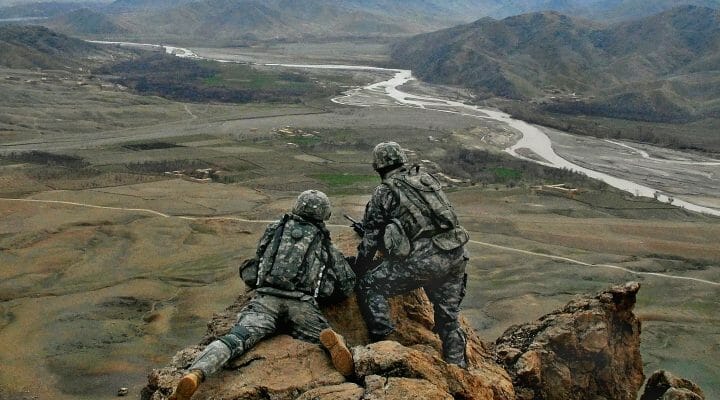While you were focused on the Trump-Putin saga, wondering what was said in a previously undisclosed meeting between the two leaders, the Afghan government has been falling into deeper dysfunction. That is saying a lot for Afghanistan, a country that practically invented government dysfunction.
Two months ago, the country’s senior vice president, the notorious warlord Abdul Rashid Dostum, fled the country amid accusations that his guards kidnapped a local elder during a buzkashi match last November. The man, Ahmad Ishchi, who the New York Times described as a political rival of Dostum, claims the vice president and his guards beat him, and raped him with a rifle.
Dostum faces the possibility of criminal charges for the incident. He fled to Turkey in April, saying he was visiting a doctor, but he remained there until yesterday. The government of President Ashraf Ghani refused to allow his plane to land in the northern city of Mazar-i-Sharif, directing it instead to the capital, Kabul. Rather than comply, the plane landed in Turkmenistan.
POLITICAL INSTABILITY IS A WAY OF LIFE FOR AFGHANS
The move threatens to further destabilize the already shaky Afghan government. Ghani was hailed as a reformer when he replaced Hamid Karzai, a man who had remained in office long past his shelf-life, in 2014.
Ghani is an American-educated anthropologist who held U.S. citizenship until he renounced it in 2009, when he first ran for president. Dostum, a burly ethnic Uzbek with a gray crew cut and bristly mustache, who once supported to Soviet occupation, but fought on horseback alongside U.S. Special Forces in 2001, seemed an unlikely choice for the intellectual Ghani.
Ghani called his partnership with Dostum a national unity ticket. But after two years in power, Ghani has been unable to curb violence in the country that has known little else besides warfare since 1979. Increasingly, his government has faced civil unrest, with police donning riot gear to quell protesters in Kabul last month. His government has also been unable to create the governance structure to manage the country effectively. Neither result should come as any surprise to observers of Afghanistan.
Dostum represents the Afghan old guard, men who have lived the maxim that political power grows from the barrel of a gun. Such has been the way in Afghanistan for as long as it has existed as a political entity. Unity is simply not in the average Afghan’s vocabulary. for most in multi-ethnic Afghanistan, loyalty is tribal, not national.
A SENSITIVE BUT CRITICAL TIME FOR THE U.S.
When Ghani chose Dostum to be his running mate, the Obama Administration took a hands-off approach, lest it be accused of meddling in the Afghan elections. From a political perspective, this was probably the best course of action. Witness our own arguments now over whether or not Russia meddled in our own elections, what effect that meddling had, and how we should respond.
From a governing standpoint, however, it was shortsighted. Choosing Dostum was politically expedient, but ultimately contributed to the continued instability in Afghanistan. Ghani was never going to be able to control Dostum, who by organizing opposition to the government he helps lead, reveals that he indeed has sights on the presidential palace.
Afghanistan may be America’s new “forgotten war,” but success or failure there is still critical to our national security. After all, the objective has been to build a stable country that will never again be used as the launching pad for attacks against the U.S. like those of September 11, 2001. But as I have said since my first tour of duty there in 2002, a country must want to be stable in order to be stabilized.
Keeping tough guys like Dostum around doesn’t get you any closer to that goal.



